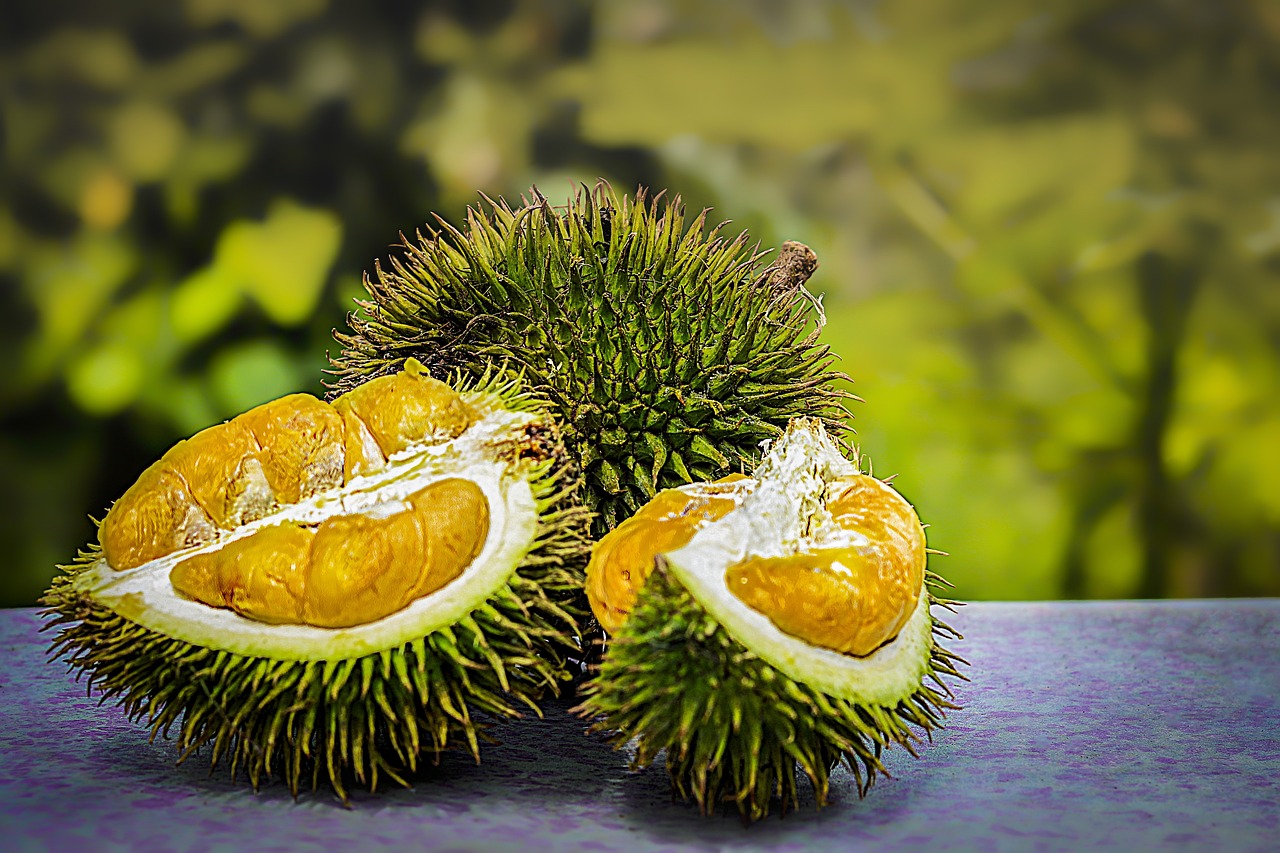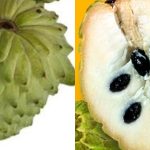Durian, often hailed as the “king of fruits,” is a tropical delicacy that evokes strong reactions from those who encounter it. Known for its pungent aroma, creamy texture, and spiky exterior, durian is a fruit that inspires both fervent devotion and vehement aversion. Whether you find its smell reminiscent of sweet almonds or akin to rotting onions, one thing is certain: durian is not a fruit to be ignored. Here you will see everything you need to know about the durian fruit: its main characteristics, benefits, side effects if any, fresh 2025’s recipes with durian. Read on!
The Polarizing Durian: King of Fruits or Olfactory Offender?
Native to Southeast Asia, durian has been a staple in local diets for centuries, celebrated not just for its unique taste but also for its numerous health benefits. Rich in essential nutrients such as vitamins C and B6, potassium, and dietary fiber, durian is often touted for its ability to boost immune health, improve digestion, and provide a quick energy boost. However, as with many foods, durian also has its drawbacks, particularly for those with certain health conditions or sensitivities.
In this article, we’ll delve into the intriguing world of durian, exploring its nutritional benefits, potential negative effects, and offering a variety of recipes to help you incorporate this distinctive fruit into your culinary repertoire. Whether you’re a seasoned durian enthusiast or a curious newcomer, join us on a journey to understand why this fruit has captured the hearts and taste buds of millions around the world.
Durian Fruit Smell
So, what does durian smell like? Oh, this “king of fruits,” is a tropical delicacy that divides opinions with its distinctive aroma and taste. Its smell is often described as a potent mix of sweet and foul odors. Some liken its aroma to a blend of almonds, overripe cheese, and turpentine, while others compare it to the stench of rotting onions or garbage. This powerful scent is so pervasive that durians are banned in many hotels and public transportation systems across Southeast Asia. Despite its polarizing smell, many durian enthusiasts find the aroma enticing and a prelude to the fruit’s rich, creamy, and custard-like flesh. The durian’s scent is a complex mix of sulfur compounds, esters, and other volatile chemicals that create a sensory experience unlike any other fruit. Taste it or not, you choose. Our choice is to try everything new and interesting 🙂
Durian vs. Jackfruit: Differences
A lot of people ask if durian and jackfruit are the same. Nope. Both durian and jackfruit are iconic fruits of Southeast Asia, often recognized by their large size and spiky exteriors. However, they differ significantly in flavor, texture, aroma, and nutritional profile! Here’s a closer look at the distinctions between these two tropical treasures. Don’t confuse these fruits!
Durian is infamous for its strong, pungent smell, often described as a mix of almonds, overripe cheese, and rotting onions. In contrast, jackfruit has a sweet, tropical aroma reminiscent of banana, pineapple, and mango. Durian’s creamy, custard-like flesh combines sweet and savory flavors, while jackfruit offers a fibrous, starchy texture when unripe and sweet, juicy flesh when ripe. Nutritionally, durian is rich in vitamins C and B6, potassium, and dietary fiber, whereas jackfruit provides vitamins A and C, magnesium, and antioxidants. However, durian’s high sulfur content can interact negatively with alcohol, and its caloric density may be unsuitable for restricted diets. Jackfruit, although generally well-tolerated, can cause digestive issues due to its high fiber content and has a higher glycemic index. Durian is prized for its bold flavor but is polarizing due to its odor, while jackfruit is more universally accepted for its mild sweetness and versatility. Both fruits offer unique culinary experiences and nutritional benefits, catering to different preferences and uses.
Durian and Mangosteen: Differences
Durian and mangosteen, known as the “king” and “queen” of fruits, are both tropical delicacies from Southeast Asia. You already know the distinct features of durian: about its strong, pungent odor, creamy, custard-like texture with a rich, sweet, and slightly savory flavor, main vitamins, fiber, and high sulfur content. In contrast, mangosteen has a mild, sweet, and slightly floral aroma with a juicy, tender texture and a flavor reminiscent of strawberries, peaches, and citrus. It’s rich in antioxidants, vitamins C and B9, and dietary fiber, providing anti-inflammatory and immune-boosting benefits. While generally well-tolerated, its high antioxidant content may interfere with certain medications.
So, together, durian and mangosteen are “a royal pair” in the world of tropical fruits. Whether you prefer the boldness of durian or the sweetness of mangosteen, both fruits deserve your attention. Just to compare and understand which one you like more.
Is Durian Banned?
The strong odor of overripe cheese, almonds, and rotting onions, which durian has, has led to its ban in numerous public spaces across Asia. In what countries is durian banned? In countries like Singapore, Malaysia, and Thailand, durian is prohibited in hotels, public transportation, and airports. The fruit’s potent aroma, which can linger long after the durian is consumed, is considered disruptive and unpleasant by many, prompting these restrictions.
All Durian Benefits You Must Know
Are durian healthy? Time to reveal all benefits of durian! Durian fruit is also known for its impressive nutritional profile. Here are some of the key health benefits of durian:
- Rich in Nutrients: Durian is packed with essential vitamins and minerals, including vitamin C, vitamin B6, potassium, and dietary fiber. These nutrients contribute to overall health and well-being.
- Boosts Immune System: The high vitamin C content in durian helps strengthen the immune system by promoting the production of white blood cells, which are crucial for fighting infections.
- Improves Digestion: Durian is a good source of dietary fiber, which aids in digestion by adding bulk to the stool and promoting regular bowel movements. This helps prevent constipation and supports a healthy digestive system.
- Provides Energy: The natural sugars (fructose and sucrose) in durian provide a quick and efficient energy boost, making it a great choice for a natural energy snack.
- Supports Bone Health: Durian contains significant amounts of potassium, magnesium, and calcium, which are essential for maintaining strong and healthy bones.
- Antioxidant Properties: Durian is rich in antioxidants, such as vitamin C and polyphenols, which help neutralize harmful free radicals in the body. This can reduce oxidative stress and lower the risk of chronic diseases.
- Improves Skin Health: The antioxidants and vitamin C in durian promote healthy, radiant skin by fighting off free radicals that cause aging and skin damage. Vitamin C also supports collagen production, improving skin elasticity and firmness.
- Heart Health: The potassium in durian helps regulate blood pressure by balancing sodium levels in the body. Additionally, the fiber content can help lower cholesterol levels, contributing to better cardiovascular health.
- Enhances Mood: Durian contains tryptophan, an amino acid that is a precursor to serotonin, a neurotransmitter that helps regulate mood and sleep. Consuming durian can potentially improve mood and alleviate symptoms of depression.
- Anti-Inflammatory Effects: Some compounds in durian, such as flavonoids and polyphenols, have anti-inflammatory properties that can help reduce inflammation and alleviate related conditions.
While durian offers numerous health benefits, it’s important to consume it in moderation due to its high calorie and carbohydrate content.
Calories in Durian
On average, a 100-gram serving of durian contains approximately 147 calories. This makes durian a relatively calorie-dense fruit compared to others, so it’s important to consume it in moderation as part of a balanced diet.
Durian Fruit: Nutrition Information and Facts
Raw durian is comprised of approximately 65% water, 27% carbohydrates (including 4% dietary fiber), 5% fat, and 1% protein. A 100-gram serving of raw or fresh frozen durian provides 33% of the Daily Value (DV) of thiamine, along with moderate amounts of other B vitamins, vitamin C, and the dietary mineral manganese (15–24% DV). Carbohydrate content in different durian varieties from Malaysia, Thailand, and Indonesia varies by 16–29%, fat content by 2–5%, protein content by 2–4%, dietary fiber content by 1–4%, and caloric value by 84–185 kcal per 100 grams. The fatty acid composition of durian flesh is notably rich in oleic acid and palmitic acid.
All You Need to Know About Durian Allergy
Durian allergy is a relatively uncommon but serious condition that can cause a range of symptoms in sensitive individuals. Reactions can vary from mild to severe and may include skin rashes, itching, swelling of the lips and tongue, difficulty breathing, and gastrointestinal issues such as nausea, vomiting, or diarrhea. In severe cases, an allergic reaction to durian can lead to anaphylaxis, a life-threatening condition that requires immediate medical attention. People with a known allergy to latex or certain tree pollens may be at a higher risk of developing an allergy to durian due to cross-reactivity. If you suspect you have a durian allergy, it’s important to avoid the fruit and seek medical advice to manage symptoms and prevent potentially dangerous reactions.
Durian and Alcohol
Durian and alcohol are often advised not to be consumed together due to potential adverse effects. Some studies suggest that the high sulfur content in durian can interact with alcohol, leading to symptoms such as nausea, vomiting, and indigestion. Additionally, both durian and alcohol are high in calories, so consuming them together is not very desirable. Also, remember that there actually is no safe doze of alcohol, even the smallest doze of it impacts you greatly. So, maybe, fruits are better than alcohol? However, the choice is yours.
Recipes with Durian
Want to uncover the delicious possibilities of durian fruit? Do this with these enticing collection of recipes! From creamy durian ice cream to decadent durian pancakes, these recipes promise to surprise and delight you. These recipes are sure to inspire your culinary adventures. Check out how this unique fruit can elevate your cooking to new heights!
Durian Boba Recipes
Durian boba, also known as durian bubble tea, is a creative fusion of the beloved Southeast Asian fruit durian and the popular Taiwanese beverage bubble tea. This drink combines the creamy, rich flavor of durian with the chewy texture of tapioca pearls, offering a unique and indulgent taste experience.
Ingredients:
– Durian Flesh: The key ingredient, providing a creamy, custard-like texture and a distinctive, sweet, and slightly savory flavor.
– Milk or Non-Dairy Milk: Used as a base to create a smooth, creamy consistency.
– Tapioca Pearls (Boba): Chewy balls made from tapioca starch, adding a fun, textural element to the drink.
– Sweetener: Sugar, honey, or other sweeteners to balance the strong flavor of durian.
– Ice: For a refreshing, chilled beverage.
Preparation:
– Blend Durian: Start by blending the durian flesh with milk and sweetener until smooth and creamy.
– Cook Tapioca Pearls: Prepare the tapioca pearls according to package instructions, usually by boiling them until they become soft and chewy.
– Assemble the Drink: In a glass, combine the durian mixture with the cooked tapioca pearls. Add ice to chill the drink.
– Serve: Stir well and serve with a wide straw to enjoy both the drink and the tapioca pearls.
Durian boba offers a delightful combination of the unique, bold flavor of durian and the playful texture of bubble tea. It’s a must-try for durian enthusiasts and adventurous bubble tea lovers looking to explore new flavors.
Whether you’re an adventurous foodie or simply curious about exotic fruits, durian offers a unique and unforgettable experience. Its rich, creamy texture and complex flavor profile make it a fruit that is hard to forget!


